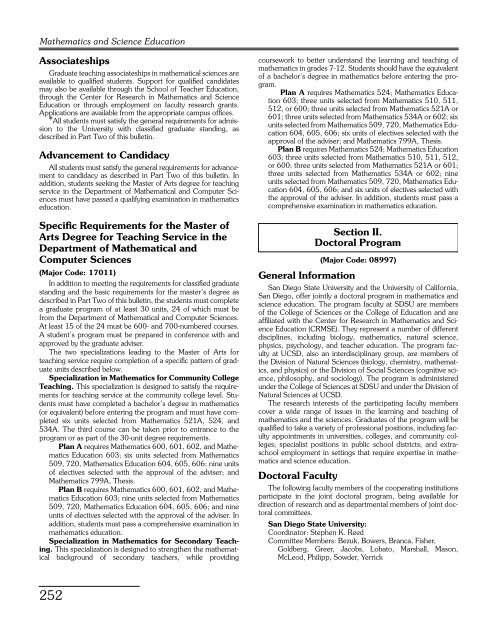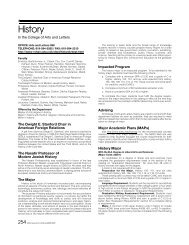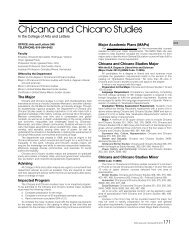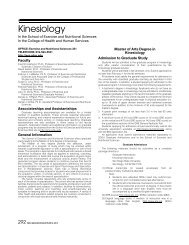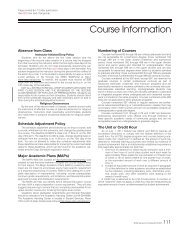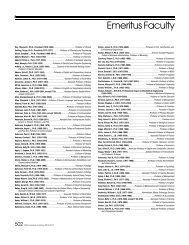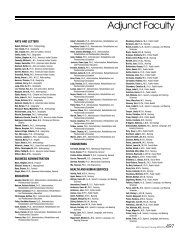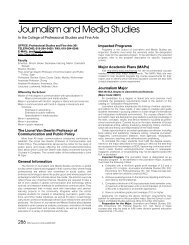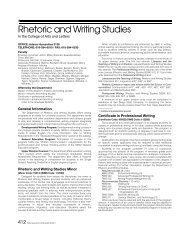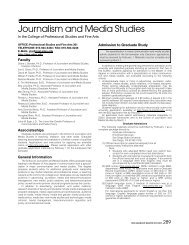President Stephen L. Weber - San Diego State University ...
President Stephen L. Weber - San Diego State University ...
President Stephen L. Weber - San Diego State University ...
You also want an ePaper? Increase the reach of your titles
YUMPU automatically turns print PDFs into web optimized ePapers that Google loves.
Mathematics and Science Education<br />
Associateships<br />
Graduate teaching associateships in mathematical sciences are<br />
available to qualified students. Support for qualified candidates<br />
may also be available through the School of Teacher Education,<br />
through the Center for Research in Mathematics and Science<br />
Education or through employment on faculty research grants.<br />
Applications are available from the appropriate campus offices.<br />
*All students must satisfy the general requirements for admission<br />
to the <strong>University</strong> with classified graduate standing, as<br />
described in Part Two of this bulletin.<br />
Advancement to Candidacy<br />
All students must satisfy the general requirements for advancement<br />
to candidacy as described in Part Two of this bulletin. In<br />
addition, students seeking the Master of Arts degree for teaching<br />
service in the Department of Mathematical and Computer Sciences<br />
must have passed a qualifying examination in mathematics<br />
education.<br />
Specific Requirements for the Master of<br />
Arts Degree for Teaching Service in the<br />
Department of Mathematical and<br />
Computer Sciences<br />
(Major Code: 17011)<br />
In addition to meeting the requirements for classified graduate<br />
standing and the basic requirements for the master’s degree as<br />
described in Part Two of this bulletin, the students must complete<br />
a graduate program of at least 30 units, 24 of which must be<br />
from the Department of Mathematical and Computer Sciences.<br />
At least 15 of the 24 must be 600- and 700-numbered courses.<br />
A student’s program must be prepared in conference with and<br />
approved by the graduate adviser.<br />
The two specializations leading to the Master of Arts for<br />
teaching service require completion of a specific pattern of graduate<br />
units described below.<br />
Specialization in Mathematics for Community College<br />
Teaching. This specialization is designed to satisfy the requirements<br />
for teaching service at the community college level. Students<br />
must have completed a bachelor’s degree in mathematics<br />
(or equivalent) before entering the program and must have completed<br />
six units selected from Mathematics 521A, 524, and<br />
534A. The third course can be taken prior to entrance to the<br />
program or as part of the 30-unit degree requirements.<br />
Plan A requires Mathematics 600, 601, 602, and Mathematics<br />
Education 603; six units selected from Mathematics<br />
509, 720, Mathematics Education 604, 605, 606; nine units<br />
of electives selected with the approval of the adviser; and<br />
Mathematics 799A, Thesis.<br />
Plan B requires Mathematics 600, 601, 602, and Mathematics<br />
Education 603; nine units selected from Mathematics<br />
509, 720, Mathematics Education 604, 605, 606; and nine<br />
units of electives selected with the approval of the adviser. In<br />
addition, students must pass a comprehensive examination in<br />
mathematics education.<br />
Specialization in Mathematics for Secondary Teaching.<br />
This specialization is designed to strengthen the mathematical<br />
background of secondary teachers, while providing<br />
252<br />
coursework to better understand the learning and teaching of<br />
mathematics in grades 7-12. Students should have the equivalent<br />
of a bachelor’s degree in mathematics before entering the program.<br />
Plan A requires Mathematics 524; Mathematics Education<br />
603; three units selected from Mathematics 510, 511,<br />
512, or 600; three units selected from Mathematics 521A or<br />
601; three units selected from Mathematics 534A or 602; six<br />
units selected from Mathematics 509, 720, Mathematics Education<br />
604, 605, 606; six units of electives selected with the<br />
approval of the adviser; and Mathematics 799A, Thesis.<br />
Plan B requires Mathematics 524; Mathematics Education<br />
603; three units selected from Mathematics 510, 511, 512,<br />
or 600; three units selected from Mathematics 521A or 601;<br />
three units selected from Mathematics 534A or 602; nine<br />
units selected from Mathematics 509, 720, Mathematics Education<br />
604, 605, 606; and six units of electives selected with<br />
the approval of the adviser. In addition, students must pass a<br />
comprehensive examination in mathematics education.<br />
General Information<br />
Section II.<br />
Doctoral Program<br />
(Major Code: 08997)<br />
<strong>San</strong> <strong>Diego</strong> <strong>State</strong> <strong>University</strong> and the <strong>University</strong> of California,<br />
<strong>San</strong> <strong>Diego</strong>, offer jointly a doctoral program in mathematics and<br />
science education. The program faculty at SDSU are members<br />
of the College of Sciences or the College of Education and are<br />
affiliated with the Center for Research in Mathematics and Science<br />
Education (CRMSE). They represent a number of different<br />
disciplines, including biology, mathematics, natural science,<br />
physics, psychology, and teacher education. The program faculty<br />
at UCSD, also an interdisciplinary group, are members of<br />
the Division of Natural Sciences (biology, chemistry, mathematics,<br />
and physics) or the Division of Social Sciences (cognitive science,<br />
philosophy, and sociology). The program is administered<br />
under the College of Sciences at SDSU and under the Division of<br />
Natural Sciences at UCSD.<br />
The research interests of the participating faculty members<br />
cover a wide range of issues in the learning and teaching of<br />
mathematics and the sciences. Graduates of the program will be<br />
qualified to take a variety of professional positions, including faculty<br />
appointments in universities, colleges, and community colleges;<br />
specialist positions in public school districts; and extraschool<br />
employment in settings that require expertise in mathematics<br />
and science education.<br />
Doctoral Faculty<br />
The following faculty members of the cooperating institutions<br />
participate in the joint doctoral program, being available for<br />
direction of research and as departmental members of joint doctoral<br />
committees.<br />
<strong>San</strong> <strong>Diego</strong> <strong>State</strong> <strong>University</strong>:<br />
Coordinator: <strong>Stephen</strong> K. Reed<br />
Committee Members: Bezuk, Bowers, Branca, Fisher,<br />
Goldberg, Greer, Jacobs, Lobato, Marshall, Mason,<br />
McLeod, Philipp, Sowder, Yerrick


